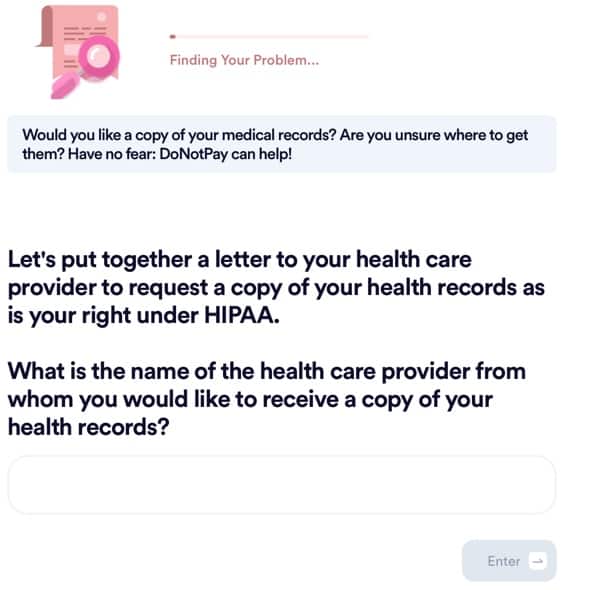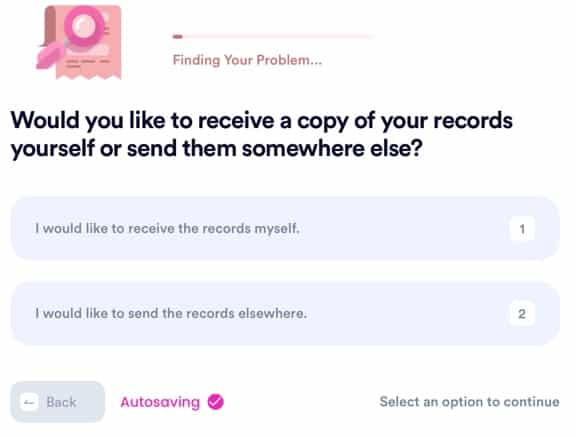DoNotPay Can Help You Get Your OhioHealth Medical Records Fast
When most people think of HIPAA laws, they think of the efforts that are made to protect their sensitive medical information. In reality, however, the Health Information Protection and Accountability Act of 1996 is also intended to give patients access to the data they need for making their own informed healthcare decisions. HIPAA gives you the right to request and receive your whenever you need them.
Unfortunately, the dual function of HIPAA often makes requesting medical records a challenge. Health service providers have both the responsibility of protecting your data and making sure that it's sufficiently available. To accomplish both of these things, all facilities have specific processes for authorizing medical records release. These can include submitting a written request for your medical records or completing one of their own medical records release forms.
Many people receive medical treatments in multiple locations and from multiple providers. When these individuals need access to their medical records, they often have to complete several different authorization forms. No matter what your circumstances or needs may be, DoNotPay can help. With the Request Medical Records product from DoNotPay, getting access to your own health data is always both quick and easy.
Several Reasons Why You Might Need Your OhioHealth Medical Records
Having access to your own medical records can be essential for avoiding redundancies in your medical treatments. This is especially true for patients with chronic or recurring issues who work with a number of doctors, alternative medicine practitioners, or specialty providers. You might also need your OhioHealth medical records if:
- Your current doctor is retiring and you preparing to work with a new one
- You have a debilitating illness and want to start end-of-life planning
- You've assigned power of attorney to someone else or will be doing so in the future
- You no longer wish to receive care at OhioHealth and have found a new provider
- You wish to keep pertinent health data on hand for emergencies
What Are Medical Records and Why Does Having Them Matter?
Every time that you receive medical care, detailed notes are taken on all diagnoses, treatments, and all preventative or interventional methods supplied. This data makes up the largest portion of your medical records. However, your medical records also contain basic details such as:
- Your name
- Your age
- Your height and weight
- Any allergies that you have
- Surgical procedures you've received
- Live births and miscarriages (when applicable)
Your medical records can additionally include a list of all diagnostic tests performed, your test results, and the names of the professionals who've provided or managed your treatments. Being able to share these records with new providers will give you the benefit of continuity across your health care. Having copies for yourself means that your family members and any emergency responders who offer you care will be well-informed about your needs, risk factors, treatment preferences, and more.
Medical records include personal health records (PHRs) that you can update and manage yourself, electronic medical records or the notes that your own doctors take and store for themselves, and your electronic health records (EHRs). When you want to have your medical records transferred to a new healthcare provider, you'll be submitting a request for the release of your EHRs.
How Much Does OhioHealth Charge for Medical Records?
You've probably got lots of questions about requesting and obtaining medical records from different healthcare facilities. Among some of the most common are:
- How long are medical records kept on file?
- How do you request medical records?
- How can I get my medical records once my request is processed?
One very important question to ask is how much a medical records request will cost. In general, most facilities don't charge patients who wish to have their medical records transferred to other hospitals or clinics. However, you may be subject to a processing fee if requesting your medical records for purposes, for personal use, or for insurance claims.
What Types of OhioHealth Medical Records Are Restricted From Being Released?
Certain restrictions exist on the types of medical records you're able to access, whether for yourself or as an authorized party. While HIPAA laws give you access to your EHRs, you are not legally entitled to receive:
- Medical records that include psychotherapy notes from any mental health professionals
- Medical records taken in anticipation of administrative action
- Medical records that may be used as part of civil or criminal action
How to Request Medical Records From OhioHealth
OhioHealth has a dedicated Health Information Management Department that handles all medical record requests and transfers. You can use OhioHealth's online platform "MyChart" or the OhioHealth app to access, manage, download, or share your PHRs. If you do not currently have it, you can request MyChart access here.
To obtain or transfer your EHRs, you must:
- Download and complete the OhioHealth Release of Information form
- Verify the accuracy of the information you've shared
- Sign the Release of Information form
- Submit your signed form to the appropriate facility
In-Person Records Requests Are Restricted at OhioHealth
In an effort to protect patient data, OhioHealth has restricted in-person records requests. If you have questions when completing or submitting your Release of Information form, you should contact the Medical Records Dept. at the facility in question.
| Address | Medical Records Department
OhioHealth Rehabilitation Hospital 1087 Dennison Avenue Columbus, OH 43201 |
| Email (OhioHealth Physician Group) | OHPhysiciansGroupROI@OhioHealth.com |
| Email (OhioHealth Hospitals) | Release-Of-Information@OhioHealth.com |
| Email (O'blesness Hospital of OhioHealth) | Release-Of-Information-OBL@OhioHealth.com |
| Phone Number | (614) 484-9600 |
| Website | https://www.ohiohealth-rehab.com/patients-and-caregivers/request-for-medical-records/ |
How to Have Your Medical Records Transferred to OhioHealth
If you wish to have your in advance of receiving care at this facility, you should download a Release of Information form. Most hospitals and clinics will have this form published on their official websites. If you cannot find it, contact Member Services at the hospital that's holding your records to request it. After you've signed and submitted your Release of Information form, your medical records should be released within approximately seven to 14 days.
Use DoNotPay to Get Your OhioHealth Medical Records
Given that each location has its own rules and requirements for obtaining medical files, requesting medical records from OhioHealth can be both time-consuming and frustrating. Depending upon why you need them, having to wait two or more weeks to have your request honored can also prove incredibly problematic. Luckily, you can both expedite this process and make it infinitely easier by letting DoNotPay handle it for you instead.
How to request medical records using DoNotPay:
DoNotPay has seen these requests before and knows how to write your health care provider a simple, clear, and effective letter that will get your legally-guaranteed health records for you in no time.
- Look up medical records on DoNotPay’s website.

- Enter the name of the health care provider you’d like to receive medical records from.

- Answer a few questions about your provider and where you’d like to send the records.

DoNotPay Works Across All Hospitals, Clinics, and Other Medical Facilities With One Click
Using DoNotPay is a quick and easy way to get your . However, the DoNotPay Request Medical Records product works across all hospitals, clinics, and other medical facilities with just one click. Thus, you can also use it to get your medical records from:
- Cleveland Clinic
- Kaiser
- Baptist Hospital
- Mercy Hospital
DoNotPay Can Help You Solve Many Other Problems
DoNotPay is the first and most popular AI Consumer Champion in the world. As such, there are many other stressful and time-consuming issues it can help you resolve, including:
- Filing formal complaints
- Drafting your advance health care directive
- Finding agencies to help with your unpaid bills
- Taking someone to small claims court
Subscribe to DoNotPay now to save money, save time, and get things done faster.


